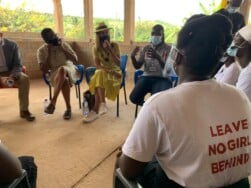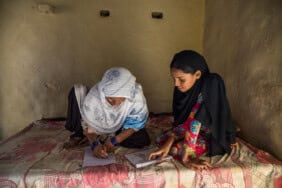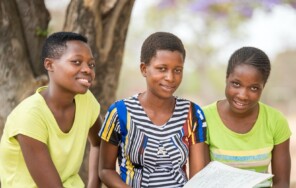Using Social and Behavior Change to Move Toward Education for All
July 31st, 2024 | Blogs
Education plays a critical role in efforts to overcome poverty, promote good health, and expand economic opportunities. For these reasons and more, ensuring access to quality education for all is a United Nations’ Sustainable Development Goal. But achieving this vision involves more than raising awareness about the value of education. Increasing enrollment and attendance, using gender-responsive practices, and extending learning beyond the classroom requires shifts in social and individual perceptions, attitudes, and behaviors.
Because awareness alone is not enough to create change, World Education, a division of JSI, integrates social and behavior change (SBC) approaches into everything we do. We work alongside local governments, community organizations, families, and educators to identify and address social and behavioral factors that promote educational success.
Access to quality education must be achieved by families and communities that embrace the value of education for everyone. Through our SBC work, we engage communities to understand existing social norms and expectations that lead to the exclusion of certain groups—such as girls and children with disabilities—from educational opportunities. We work with these communities to identify practices and behaviors that either perpetuate or challenge these norms and then develop context-specific solutions to inspire change.
 In some districts of Ghana, for example, young women and girls are traditionally expected to work in the home and care for younger children. These and other social norms combined with high poverty levels often keep these girls out of school. Through our Strategic Approaches to Girls’ Education (STAGE) project, we worked with the community oversight committees, policy makers, and other local partners to shift local perspectives and move more than 8,000 girls ages 10-14 into school.
In some districts of Ghana, for example, young women and girls are traditionally expected to work in the home and care for younger children. These and other social norms combined with high poverty levels often keep these girls out of school. Through our Strategic Approaches to Girls’ Education (STAGE) project, we worked with the community oversight committees, policy makers, and other local partners to shift local perspectives and move more than 8,000 girls ages 10-14 into school.
We organized community gatherings to spark discussions on gender equality and generate support for girls’ education. To align with local communities, we incorporated the Ubuntu philosophy, which emphasizes interconnectedness and cooperation, to indicate how girls’ education contributes to community well-being and stability. One participating caregiver noted, “the activities have changed my perception on girls’ vocational education and economic empowerment.”
In Nepal, in partnership with UNICEF, we used a system-level SBC approach to get more children with disabilities into school and support their academic success. We worked from the government to the classroom level to establish policies and processes supporting education for children with disabilities and improve access to education for children with disabilities living in remote areas. We worked with communities to develop and share messages with teachers and parents, including translating a children’s book into Nepali that promotes the idea that children learn at different speeds and require different types of support. This changed beliefs about which children deserve support and which children are able to learn—all of them!

Research shows that parental involvement has an important and positive impact on student achievement, attendance, and behavior. We use SBC to increase parent engagement and help improve learning.
In Nepal, we established teams of “Learning Motivators” to go house-to-house and work with parents to identify home-learning practices that were feasible for them, such as creating home-learning spaces. Parents also ran more than one-third of the community learning groups that the project established due to school closures.
To stay in school and succeed in the classroom, young people need safe learning environments and support for healthy choices. Our SBC work includes supporting good health habits, financial literacy, and life skills so young people can make informed decisions.
 Through the Siyakha Girls economic empowerment model, an eight-step approach to sustainable livelihoods for young women ages 18-24 in sub-Saharan Africa, participants learn to build social assets and access essential health and social services. This helps them make informed decisions about their health, reducing their risk of HIV, early marriage, and early pregnancy. The program teaches negotiation and communication skills that strengthen their ability to advocate for themselves, helping to mitigate violence, pressure, discrimination, and stigma. Siyakha also pairs the young women for peer support and engages young men to do their part in preventing gender-based violence.
Through the Siyakha Girls economic empowerment model, an eight-step approach to sustainable livelihoods for young women ages 18-24 in sub-Saharan Africa, participants learn to build social assets and access essential health and social services. This helps them make informed decisions about their health, reducing their risk of HIV, early marriage, and early pregnancy. The program teaches negotiation and communication skills that strengthen their ability to advocate for themselves, helping to mitigate violence, pressure, discrimination, and stigma. Siyakha also pairs the young women for peer support and engages young men to do their part in preventing gender-based violence.
Through the STAGE project, out-of-school girls in Ghana participated in an accelerated learning program to strengthen their foundational literacy and numeracy skills before transitioning to a traditional school or vocational training. Two years after completing this program, more than 90 percent of the girls who transitioned to school were still enrolled.
For the girls connected with technical and vocational training programs, we worked with mentors to incorporate more gender-sensitive approaches and ensure teenage mothers, girls with disabilities, and other traditionally excluded groups felt welcome. After completing their vocational training, 93 percent of participants reported effective support, encouragement, and gender-sensitive training.
By using SBC approaches like these, we promote access to education by analyzing and addressing the root causes of exclusion and designing programs that meet people where they are in their learning journey.
World Education fosters enduring partnerships across regions and sectors to advance education outcomes for all. We offer education systems strengthening, program design and implementation, applied research and evaluation, capacity development, and policy development services.